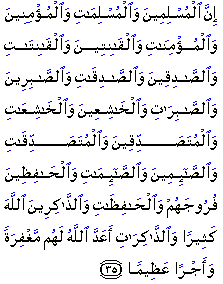Living The Quran
From Issue: 652 [Read full issue]
Women's Status
Al Ahzab (The Confederates) - Chapter 33: Verse 35
 "For Muslim men and women, for believing men and women, for devout men and women, for true men and women, for men and women who are patient and constant, for men and women who humble themselves, for men and women who give in charity, for men and women who fast, for men and women who guard their chastity, and for men and women who engage much in Allah's praise, for them has Allah prepared forgiveness and great reward."
"For Muslim men and women, for believing men and women, for devout men and women, for true men and women, for men and women who are patient and constant, for men and women who humble themselves, for men and women who give in charity, for men and women who fast, for men and women who guard their chastity, and for men and women who engage much in Allah's praise, for them has Allah prepared forgiveness and great reward."
Initially, Quranic verses used only the masculine plural form to refer to the women and men in the new faith community. For years, "believers" (al-muminun), and "the truthful" (as-sadiqun), either referred specifically to men or to the men and women who constituted the Prophet's first Companions. Once, a woman (or several, according to the different traditions) asked the Prophet why women were not explicitly mentioned in the revealed message. The Book - which, while revealing a universal message, also included responses to the questions asked by the Men around the Prophet - was later to mention women and men distinctively, as in the above verse.
This evolution of the message is part of divine teaching in the process of revelation carried out over twenty-three years: the faithful are thus led to evolve in their understanding of things and critically reconsider some of their cultural or social practices. The status of women, who were sometimes killed at birth because of the shame they might bring, was to be reformed in stages, as verses were revealed.
It thus appeared more and more clearly that the Quran's message and the Prophet's attitude were apt to free women from the cultural shackles of Arab tribes and clans and from the practices of the time. The Creator addresses women as being on an equal footing with men, their status as beings and believers is the same as men's, and the requirements of worship are absolutely identical. The Medina period helped sort out the religious principles from Meccan Arab customs and bring about changes in women's status: the reform movement was thus started and accompanied by the Revelations, by social experiments, and, of course, by the Prophet's attitude as the example the Companions were to follow.
The different verses were therefore to be read and interpreted in the light of that movement, and early readings and interpretations of revealed texts were to be viewed in the ideal mirror of the Prophet's behaviour. The inner reform movement was perceived, understood, and commented on from the first centuries, during which the text sciences was established, but it remains true that early readers were mainly men who read the Revelation through the double prism of their gender and of the culture in which they necessarily lived.
The Companions and early ulama could not but read the text in the light of their own situation, viewpoint, and context. While the Book spoke about women, their being and their heart, fuqaha set out to determine duties and their rights according to the various functions society imparted them. Women were therefore "daughters," "sisters," "wives," or "mothers"; the legal and religious discourse about women was built on those categories. It is indeed difficult for a man, and what is more a jurist, to approach the issue of women primarily as beings in their integrity and autonomy: whatever the internal process initiated by the different revelations or historical experiences, such an approach inevitably orients and restricts the reading and interpretation of texts. Their concern was to impart a function to women, to draw up a list of rights and duties. A closer reading of the texts, however, shows that the purpose of the inner evolution just mentioned, revisiting women's status step by step, is in fact to bring the believing conscience to perceive women through their being, beyond their different social functions. This inductive movement toward the primacy of being naturally involves an effect on the issue of social status; this, however, implies allowing full scope to the interpretation process and accepting all its consequences.
Compiled From:
"Radical Reform: Islamic Ethics and Liberation" - Tariq Ramadan, pp. 209-211